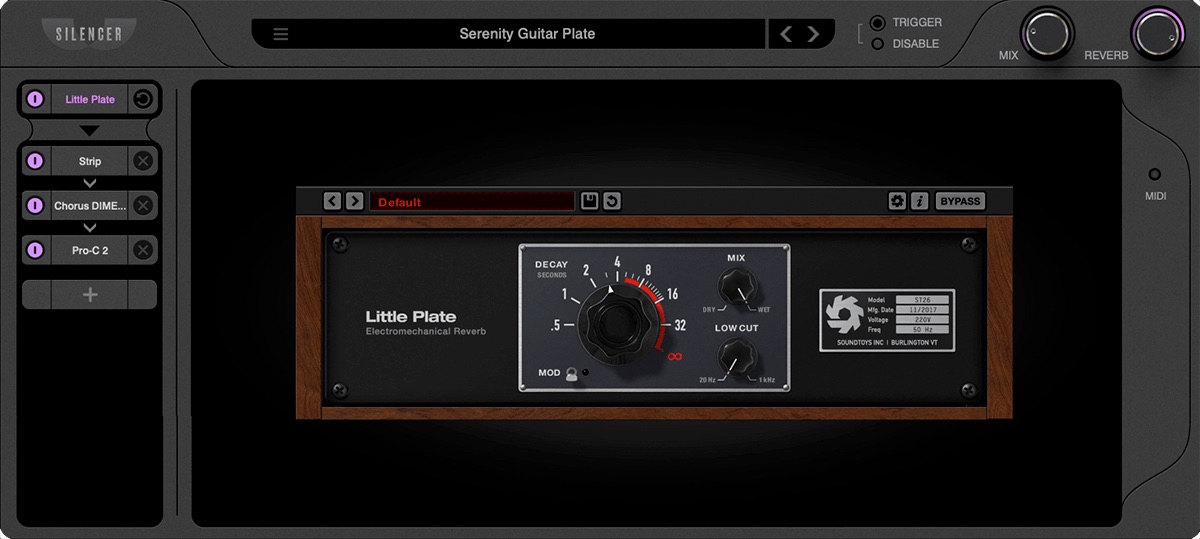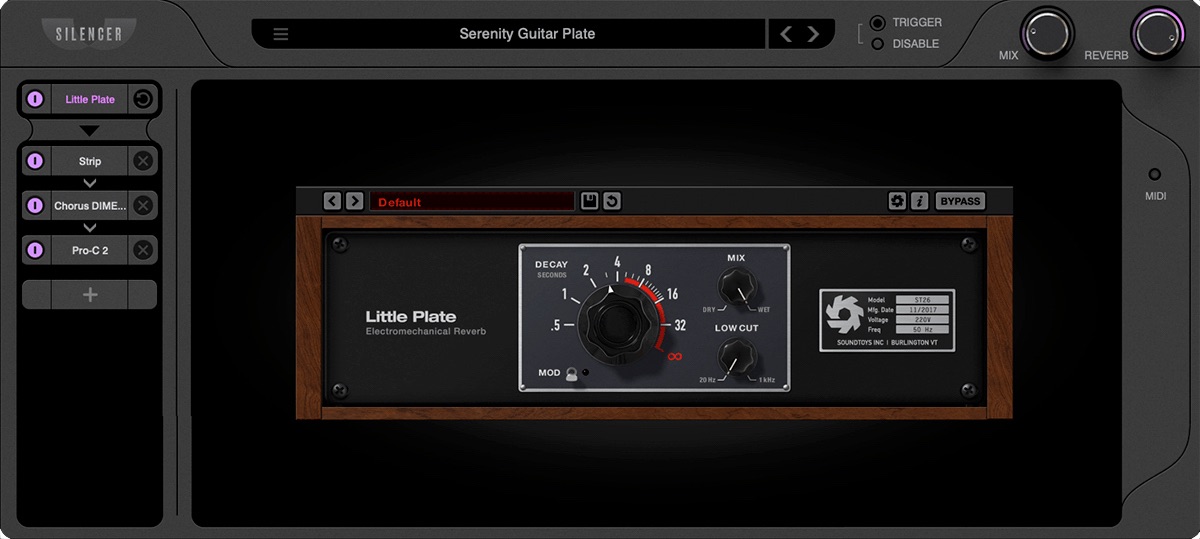LOS ANGELES, CA, USA: after an early access soft launch, inspiring, unique, and filler-free music tools creator Wide Blue Sound is proud to announce availability of SILENCER to the wider paying public — reimagining reverb as a first- of-a-kind plug-in that effectively supercharges already-owned reverb plug-ins to take sound design and mixes to the next level by being anchored around a patent-pending process called TimeGate that completely resets the reverb signal on each note (silencing undesirable reverb that would otherwise sustain over multiple notes and accumulate frequencies that clutter clarity and intelligibility of all instruments, vocals, and mixes as a whole) while also drawing upon several new effects developed to enhance and clean up the resulting sound still further, as well as allowing users to continue designing their own personal reverb sounds, subsequently saving an entire chain as a preset and acting as a reverb management tool in the process — as of October 28…


Simply said, SILENCER represents reverb where it is wanted — as opposed to where it is not needed. Needless to say, SILENCER’s signature is its TimeGate slot, handily hosting any user’s favourite reverb plug-ins and re-triggering them using a uniquely efficient CPU (Central Processing Unit) process — patent-pending, no less — that clears the buffer and starts a brand-new reverb for each audio transient. The resultant overall sound has 100% clarity, thanks in no small part to the reverb following each transient sounding so pristine since it starts over on the new note. Notable benefits include punchier-sounding drums — add space around them without muddying up the transients; clarity-enhanced leads, chords, and vocals — free from the counterproductive reverb overflow of previous pitches; vintage sample-sounding beats — adding loads of reverb that restarts on each note can sound like there is reverb in the sample itself, all the while keeping everything flexible; and eliminating phase issues on bass/kick reverbs without removing all the low end. Even though all such examples work well with conventional reverb sounds, users are also encouraged to use SILENCER to design the most dirty, cinematic, or otherworldly reverbs imaginable for themselves, then use re-triggering to turn it into a polished but surreal mix — and all with unparalleled levels of control. It is also possible to trigger reverbs via MIDI (Musical Instrument Digital Interface) notes, the audio transients of a sidechain signal, or manually perform/automate it via the TRIG (trigger) button. It is fair to say that users have to hear TimeGate to believe it, while re-triggering reverb is optional of course.
Signature sound-crafting comes quickly to SILENCER users, thanks to three proprietary modules often using the incoming dry signal to control various effects on the wet signal: STRIP easily enables adding massive WEIGHT and beautiful AIR by utilising a legendary BBE Sonic Maximiser algorithm that makes reverbs sound epic, while its GATE can quickly add groove to reverbs (using the dry signal for detection) to give them a punchier sound, and SPREAD pans the dry and wet signals in opposite directions, creating a magical 3D effect used on radio hits to carve out room in the centre of the mix while still adding dimension; secondly, FOCUS EQ enables users to easily enhance the important frequencies of any instrument by cutting the reverb and optionally boosting the dry signal at the same critical frequency; and, thirdly, SIDECHAIN compresses the reverb based on the dry signal (with SILENCER taking care of the routing), RELEASE doing several things to provide different tones, while a filter assists users with fine-tuning the detection circuit (by telling SILENCER which frequencies to listen to from the dry signal). It is worth noting here that SILENCER users can add their favourite VST (Virtual Studio Technology) effect plug-ins to its Plugin Manager for speedy access; as such, these only affect the wet reverb signal.
SILENCER supercharges already-owned reverb plug-ins still further by allowing users to save their favourite reverb set-ups in one place — regardless of plug-ins used — and quickly audition them. Therefore, SILENCER effectively acts as a great reverb management tool. To further ease sound experimentation, enabling Reverb Lock lets users ensure that their chosen reverb plug-in does not change as they audition presets — only SILENCER’s effects modules are swapped in the process of doing so.
Says Wide Blue Sound Founder & CEO Nathan Rightnour by way of further background, but also ending on some serious — and not-so-serious — SILENCER- summarising high notes: “We adore reverb; it’s our favourite effect. From day one, however, we were clear about one thing: we didn’t want to push another reverb algorithm into the market. Reverb takes a long time to get right, evidenced by the fact that the finest reverb-makers specialise in only doing that. We’re music producers first, and if we could continue using all our favourite reverbs, we’d rather do that. SILENCER is future-proof and will work with your current and future reverb plug-ins. It’s the best of all reverb worlds. We like to joke that the last reverb you’ll ever need isn’t a reverb at all!”
SILENCER is available to purchase — priced at $99.00 USD (with a no-nonsense 14-day money-back guarantee) — directly from the Wide Blue Sound website, which also includes more in-depth info, here: https://www.widebluesound.com/silencer/ (Anyone wishing to test their reverb plug-ins before committing themselves to purchasing SILENCER can download a time-unlimited demo version — with occasional gentle white noise and no recall/presets functionality — for free.)
SILENCER supports macOS 10.13 High Sierra (and above) — it is optimised for Apple Silicon — and Windows Vista (and above); its CPU and RAM (Random Access Memory) usage is minimal, while such usage is up to the user when employed as a plug-in host. However, it is worth noting here that though SILENCER itself runs in all modern plug-in formats, such as AAX, AU, and VST3, it is currently capable of only loading VST3 plug-ins — for stability and UX (User Experience) reasons, meaning users must have the VST3 version of a plug-in installed in order for SILENCER to load it; in this regard, the silver lining is that since SILENCER can run VST3 in any DAW (Digital Audio Workstation) — including Apple Logic Pro and Avid Pro Tools — it can act as a VST3 bridge for any type of plug-in… simply load any plug-in into the TimeGate slot and voila! (Wide Blue Sound is keen to stress that it is testing a mode that allows SILENCER users to host AUs instead of VST3s, but this is being scrutinised for stability and up to standard UX.)
Watch Wide Blue Sound’s official walkthrough video here: https://youtu.be/2Ll9jthX_CM
